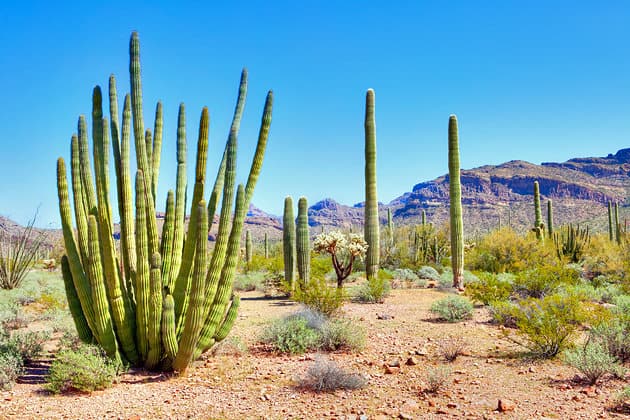Summary
- Beaver Falls in Havasu Creek
- Saguaro National Park
- Goldfield Ghost Town, Apache Junction
- Havasu Creek
- Hoover Dam
- Hunts Mesa, Monument Valley
- Jerome Arizona Ghost Town
- Lake Mead National Recreational Area
- London Bridge – Lake Havasu
- Montezuma Castle Near Camp Verde
- Monument Valley
- Organ Pipe Cactus National Monument
- Saguaro National Park
- Sonoran Desert
- The town of Sedona
- Tumacacori National Historic Park
- White House Ruins at Canyon De Chelly
The sun-drenched state of Arizona offers a plethora of attractions, making it an exciting destination for visitors. Iconic landmarks such as the Grand Canyon are recognized globally. Explore the 17 most captivating locations in the state of Arizona!
1. Beaver Falls in Havasu Creek

Accessing Beaver Falls can be challenging, yet the breathtaking scenery makes it worthwhile.
This set of falls is the fifth in the region, located immediately following Mooney Falls.
Originally, some sections of the falls soared to fifty feet; however, the floods of 1910 caused significant damage. Visitor’s can observe markings indicating how high the waters reached during the flood.
2. Saguaro National Park

Located in the southern region of Arizona, Saguaro National Park is a haven for nature enthusiasts.
The park derives its name from the towering Saguaro cacti that dominate much of its landscape. Visitors should explore the 150 miles of hiking trails offered throughout the park.
Covering 91,442 acres, over 75% of the park is designated wilderness.
3. Goldfield Ghost Town, Apache Junction

Established in 1892, Goldfield was a vibrant community situated near the Superstition Mountains that had recently discovered gold.
Now, it stands as a ghost town, revitalized for visitors to appreciate its historical significance.
During your visit to the ghost town, consider taking a tour of the underground mines.
4. Havasu Creek

Havasu Creek begins modestly as a trickle cascading from the canyon wall.
This waterway extends approximately fifty miles before merging into Cataract Canyon.
Renowned for its stunning blue-green water, the creek’s unique coloration is attributed to the elevated calcium carbonate levels that create limestone formations in the vicinity.
5. Hoover Dam

Hoover Dam is located on the boundary between Arizona and Nevada, constructed throughout the 1930s.
This significant structure currently supplies electricity to California, Nevada, and Arizona, attracting approximately one million visitors annually.
6. Hunts Mesa, Monument Valley

Hunts Mesa is situated along the southeastern edge of Monument Valley.
A visit to Hunts Mesa offers panoramic views of the distant sandstone formations.
Accessing the area requires traversing the sand dunes located northeast of Kayenta.
7. Jerome Arizona Ghost Town

Jerome is acknowledged as the largest ghost town in the United States. Copper, silver, and gold mining operations commenced in the area in 1876, leading to residential expansion.
By 1920, the town housed approximately 15,000 residents, flourishing economically.
However, with plummeting copper prices, the last mine ceased operation in 1953, resulting in the town’s abandonment.
8. Lake Mead National Recreational Area

Lake Mead is a popular destination for recreational activities, where visitors can engage in fishing, boating, sightseeing, or enjoying a picnic.
This area is home to numerous species of flora and fauna that have adapted to the warm and arid climate.
9. London Bridge – Lake Havasu

Initially, London Bridge spanned the River Thames in London until it was discovered to be sinking.
The founder of Lake Havasu City acquired the bridge for $2,460,000 and invested an additional $7,000,000 in its transportation to the current location.
The bridge was then meticulously reconstructed into its present form.
10. Montezuma Castle Near Camp Verde

Montezuma Castle is recognized as a National Monument, safeguarding a collection of Ancestral Puebloan cliff dwellings used by the Sinagua people.
The Sinagua thrived in this region from 1100 to 1425 AD.
The castle features a five-story structure comprised of twenty rooms.
11. Monument Valley

Monument Valley Navajo Tribal Park spans an expanse of sandy terrain lying between the borders of Arizona and Utah.
The landscape features striking red hues and numerous sandstone towers that rise dramatically, some reaching heights of 1,000 feet.
As sunlight traverses the sky, the shadows cast by these towers create compelling photographic opportunities.
12. Organ Pipe Cactus National Monument

Located in the heart of the Sonoran Desert, Organ Pipe Cactus National Monument offers a multitude of scenic drives and opportunities for camping in designated areas, allowing visitors to experience the desert landscape overnight.
13. Saguaro National Park
In the southern part of Arizona, you will once again find Saguaro National Park.
The park’s name originates from the majestic Saguaro cactus, which thrives throughout its expanse.
Visitors are encouraged to explore its extensive network of 150 miles of hiking trails, complemented by its overall area of 91,442 acres, with over three quarters classified as wilderness.
14. Sonoran Desert

The Sonoran Desert spans nearly 100,000 square miles.
This desert is the hottest in North America; however, its higher rainfall compared to other deserts allows for a rich diversity of plant life.
15. The town of Sedona

Encircled by 1.8 million acres of national forest, the town of Sedona is a popular destination.
This region is held sacred by Native Americans, with many asserting that it promotes healing and spiritual renewal.
The streets are adorned with art galleries, and visitors can find numerous spas for relaxation and rejuvenation.
16. Tumacacori National Historic Park

Within Tumacacori National Historic Park, remnants of three Spanish mission communities can be found.
The buildings fell into disrepair after numerous Apache raids throughout the 19th century, leading to the abandonment of the structures.
Visitors today can explore the historic ruins within the National Park.
17. White House Ruins at Canyon De Chelly

The White House site at Canyon De Chelly is managed by the Navajo Tribal Trust.
Access requires participation in a guided tour through designated companies, providing breathtaking views of the sandstone spire, which rises 750 feet from the canyon floor.





